

Networked: The New Social Operating System (A Review Part 1) The following is a review of Lee Rainie and Barry Wellman’s new book Networked: The New Social Operating System (MIT Press).
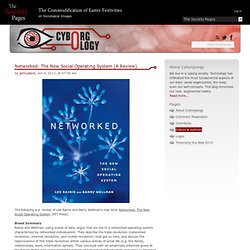
Broad Summary Rainie and Wellman, using scores of data, argue that we live in a networked operating system characterized by networked individualism. They describe the triple revolution (networked revolution, internet revolution, and mobile revolution) that got us here, and discuss the repercussions of this triple revolution within various arenas of social life (e.g. the family, relationships, work, information spread). They conclude with an empirically informed guess at the future of the new social operating system of networked individualism, indulging augmented fantasies and dystopic potentials.
Raine and Wellman argue that the “group” versus “individual” dichotomy is fallacious. A internet está nos deixando loucos? Vivemos uma nova era dominada pela tecnologia, que supostamente nos faria mais felizes, próximos uns dos outros, literalmente conectados, produtivos e com mais tempo livre.
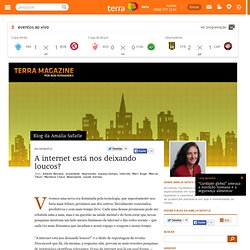
Cada uma dessas promessas pode ser rebatida uma a uma, mas é na questão na saúde mental e do bem-estar que novas pesquisas mostram um lado menos luminoso da internet e das redes sociais – que cada vez mais deixamos que invadam o nosso espaço e ocupem o nosso tempo. “A internet está nos deixando loucos?” É o título de reportagem da revista Newsweek que dá, ela mesma, a resposta: sim, provam as mais recentes pesquisas de instituições científicas relevantes. O uso da internet seja lá em qual forma – portátil, social, acelerada – encoraja ou eventualmente promove a insanidade, diz uma das especialistas ouvidas. (leia mais em thedailybeast.com/newsweek/2012/07/08/is-the-internet-making-us-crazy-what-the-new-research-says.html) Sharing Gains Currency on Internet. ANTHROPOLOGIST BIOGRAPHIES - Appadurai.
By Layla Al-Zubaidi * Posted May 1998 1.
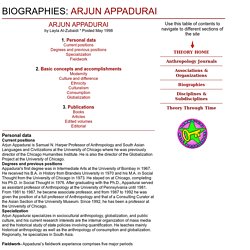
Personal data Current positions Degrees and previous positions Specialization Fieldwork 2. The Future Isn't About Mobile; It's About Mobility - David Armano. By David Armano | 8:03 AM July 18, 2012 While the globe grapples with uncertain economic realities, “mobile” appears to be gold.
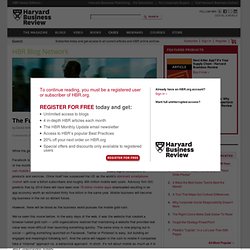
Facebook is expected to announce their uniquely targeted mobile advertising model before the end of the month. Amazon is talking to Chinese manufacturer Fox Conn with ambitions of building their own mobile device to serve as a complement to Amazon’s considerable digital ecosystem of products and services. China itself has surpassed the US as the world’s dominant smartphone market with over a billion subscribers and roughly 400 million mobile web users. Advisory firm IDC predicts that by 2014 there will have been over 76 billion mobile apps downloaded resulting in an app economy worth an estimated thirty five billion in the same year.
However, there will be blood as the business world pursues the mobile gold rush. We’ve seen this movie before. Portal SESCSP. Gaming with a Purpose. Serious games tap into the same culture of online friendship from social networking to fuel peer involvement and encourage collaboration around real-world challenges.
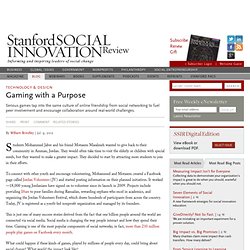
Students Mohammed Jaber and his friend Motasem Masalmeh wanted to give back to their community in Amman, Jordan. They would often take time to visit the elderly or children with special needs, but they wanted to make a greater impact. They decided to start by attracting more students to join in their efforts. To connect with other youth and encourage volunteering, Mohammed and Motasem created a Facebook page called Jordan Volunteers (JV) and started posting information on their planned initiatives.
It worked—18,000 young Jordanians have signed on to volunteer since its launch in 2009. This is just one of many success stories derived from the fact that one billion people around the world are connected via social media. Www.scielo.br/pdf/hcsm/v13n2/02.pdf. As gerações X, Y e Z no trabalho voluntário. Voluntarios de las Naciones Unidas: Voluntarios en línea premiados por su ‘extraordinaria’ contribución a la paz y el desarrollo. Voluntarios en línea premiados por su ‘extraordinaria’ contribución a la paz y el desarrollo.
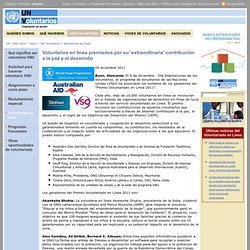
Shift and Reset: Strategies for Addressing Serious Issues in a Connected Society (9780470942673): Brian Reich, Jean Case. Paul Miller: Offline. Compassion in a Hyperconnected World : : Mingkok : Buddhistdoor. One might naively assume that, in an Information Age where current events are accessible through not only conventional news outlets but also grassroots media sharing via the Internet, there would be more people than ever before engaging themselves in positive causes.
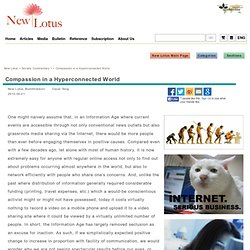
Compared even with a few decades ago, let alone with most of human history, it is now extremely easy for anyone with regular online access not only to find out about problems occurring almost anywhere in the world, but also to network efficiently with people who share one's concerns. And, unlike the past where distribution of information generally required considerable funding (printing, travel expenses, etc.) which a would-be conscientious activist might or might not have possessed, today it costs virtually nothing to record a video on a mobile phone and upload it to a video sharing site where it could be viewed by a virtually unlimited number of people.
This theory is part of the answer, but not the complete answer. Www.itofisher.com/mito/archives/pppintro.pdf. The Hyperlinked Society: Questioning Connections in the Digital Age / Joseph Turow and Lokman Tsui, Editors. Page 250 Are Hyperlinks “Weak Ties”?
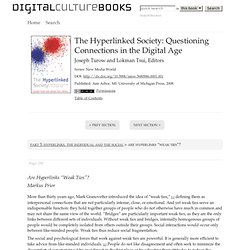
Markus Prior More than thirty years ago, Mark Granovetter introduced the idea of “weak ties,”[1] defining them as interpersonal connections that are not particularly intense, close, or emotional. And yet weak ties serve an indispensable function: they hold together groups of people who do not otherwise have much in common and may not share the same view of the world. “Bridges” are particularly important weak ties, as they are the only links between different sets of individuals. The social and psychological forces that work against weak ties are powerful. In light of these pressures toward homogeneity, weak ties gain importance because they expose people to crosscutting views. Recent studies of weak ties in the political realm have offered different assessments of their ability to support civic discourse and deliberative democracy.
The Hyperlinked Society: Questioning Connections in the Digital Age (The New Media World) (9780472070435): Lokman Tsui, Joseph Turow. "Personal connections in the digital age," by Nancy K. Baym. Nancy Baym.
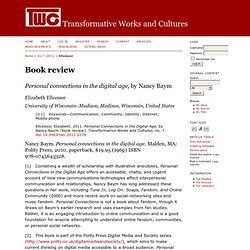
Personal connections in the digital age. Malden, MA: Polity Press, 2010, paperback, $19.95 (196p) ISBN 978-0745643328. Personal connections in the digital age digital media and society - Pesquisa Google. Leading in a Hyperconnected world. Libro humanidad y Conectividad. La sociedad de la ignorancia. Solidaridad en la Red. Desde hace años, Internet nos ofrece una multiplicidad de actividades solidarias y nos invita a ser socialmente responsables.
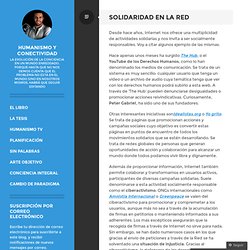
Voy a citar algunos ejemplo de las mismas. Hace apenas unos meses ha surgido The Hub, o el YouTube de los Derechos Humanos, como lo han denominado los medios de comunicación. Se trata de un sistema es muy sencillo: cualquier usuario que tenga un vídeo o un archivo de audio cuya temática tenga que ver con los derechos humanos podrá subirlo a esta web. Elogio de la solidaridad. La humanidad goza hoy de la tecnología capaz de organizar sus maravillosas habilidades, con la finalidad de crear una sociedad más evolucionada, una sociedad mejor. Una comunidad que empieza a comprender, que la interconexión con el prójimo la transforma y que valora como nunca la cooperación, está surgiendo. Las redes sociales han emergido como una pulsión intrínseca para invitarnos a vivir la oportunidad de elevarnos hacia la integración y la ampliación del potencial humano consciente.
Hoy, ya es posible coordinar y organizar las acciones humanas para lograr objetivos humanísticos globales, sin que se pierda la capacidad de desarrollo individual o local. Social Capital in the Connected Society / Democratic Evaluation / Issue Archive / The Evaluation Exchange / Evaluation. Andrew Nachison, director of the Media Center, an organization that studies the intersection of media, technology, and society, writes about social capital and democratic processes in a digital society. When Hurricane Katrina devastated New Orleans, the Federal Emergency Management Agency (FEMA) turned to the American Red Cross for a variety of disaster relief services, such as running shelters and distributing food and water to evacuees.
One of FEMA's requests was unexpected, and the Red Cross had to quickly assemble experts and tools to respond to it: FEMA asked the Red Cross to set up Internet kiosks and computer networks in shelters so that evacuees could go online. In the aftermath of the hurricane, the Internet became a disaster lifeline for evacuees. Internet kiosks in shelters served as communications gateways through which individuals displaced by Katrina could attempt to find both services and family members. Social Media Acitvism/Slacktivism « ryandeese. Navegando el cambio: crisis, conectividad, tecnología y sociedad. Conectividad y telecomunicaciones para sociedad de la información y el conocimiento.